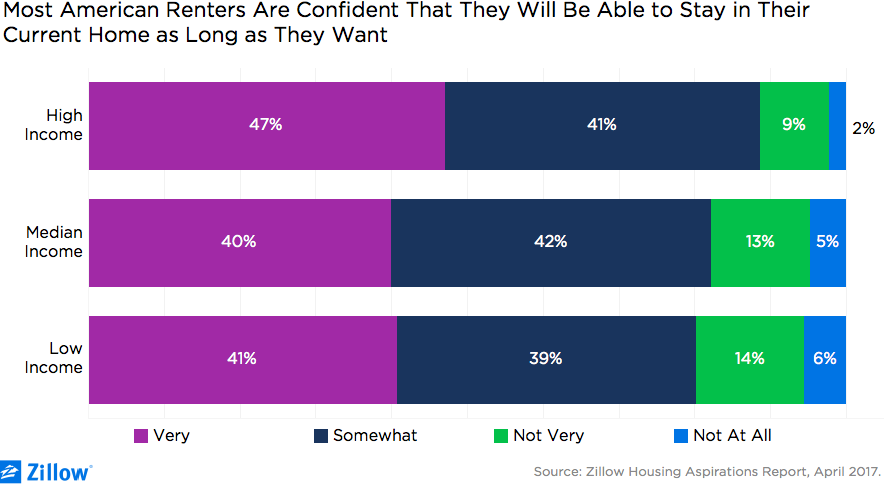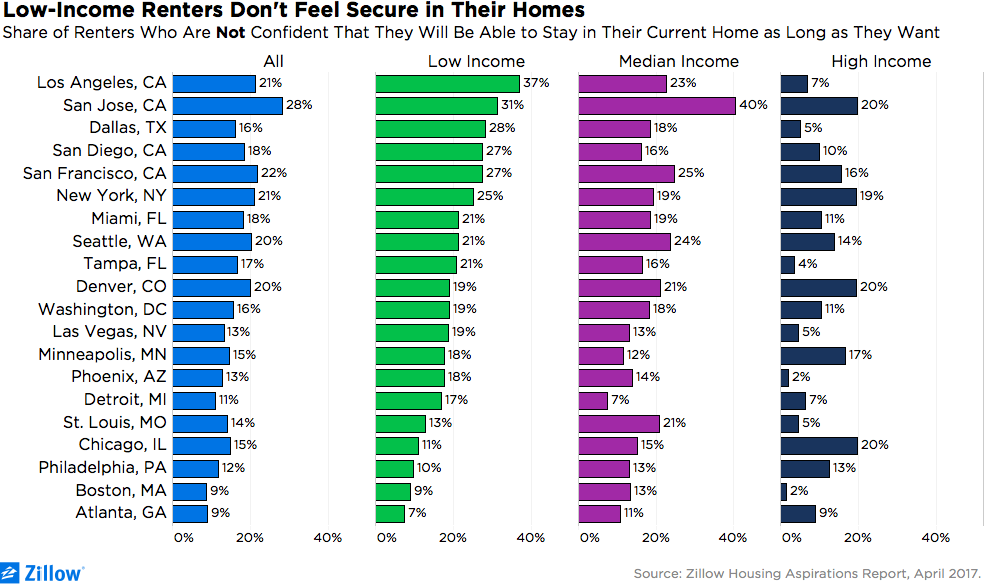Despite Rising Costs, Most Renters Feel Secure in Their Homes
Most U.S. renters – including lower-income renters – feel confident they will be able to stay in their current homes as long as they want. Lower-income renters in Los Angeles, San Jose and Dallas feel least secure in their ability to stay long-term.
- Most American renters – including lower-income renters – feel confident that they will be able to stay in their current home as long as they want.
- Lower-income renters in Los Angeles, San Jose and Dallas feel least secure in their long-term ability to stay in their homes.
- Renters living in ZIP codes with the fastest-rising rents were five times more likely than renters in the slowest-growing ZIPs to say they were not confident they will be able to stay in their current home as long as they want.
Despite consistently rising rents in many markets nationwide, most American renters say they are confident in their ability to stay in their current homes as long as they want.
Nationwide, 83 percent of renters surveyed as part of the Zillow Housing Aspirations Report (ZHAR) said they are either “very confident” or “somewhat confident” they will be able to stay in their current home as long as they want. Just 4 percent said they are “not at all confident” in their long-term ability to stay in their homes, and 13 percent said they are “not very confident.”
Rapid growth in rents over the past several years has prompted fears of some renters getting priced out of their homes and being forced to move, especially in fast-growing urban neighborhoods. These data show that while there is some truth to those fears among certain groups, it’s not a pressing concern for the majority of American renters.
More Money, Fewer Worries
Dividing renters into three equal income groups – high-, median- and low-income renters – at least 40 percent of renters in all three categories said they are “very confident” in their ability to stay in their current home as long as they want. Higher-income renters, perhaps unsurprisingly, expressed higher confidence on average. Among renters in the top one-third of the income distribution in their metro, 87 percent said they are “very confident” or “somewhat confident” that they will be able to stay in their current home as long as they want, compared to 80 percent of renters in the bottom-third of the income distribution.


Across the 20 markets included in the survey, renters in San Jose (28 percent), San Francisco (22 percent), Los Angeles (21 percent), New York (21 percent), Seattle (20 percent) and Denver (20 percent) were most likely to say they are not confident their long-term ability to stay in their current home. At the other extreme, renters in Boston (9 percent), Atlanta (9 percent), Detroit (11 percent), Philadelphia (12 percent), Phoenix (13 percent) and Las Vegas (13 percent) expressed the most confidence in their ability to stay in their current homes as long as they want.
There are some differences across income groups. For instance, lower-income renters in Los Angeles, San Jose and Dallas said they felt the least secure in their homes. For middle-income renters, San Jose, San Francisco and Seattle had the highest incidence of renter insecurity. High-income renters reported feeling least secure in their homes in Chicago, San Jose and Denver.
Controlling for age and income, renters living in Zip codes with rapidly appreciating rents were significantly more likely to express little confidence that they will be able to stay in their current home long-term. Renters living in ZIP codes with 2016 annual rent appreciation rates in the top one-third nationwide[1] were five times more likely than those living in the slowest-appreciating ZIP codes[2] to express slim confidence in their ability to stay in their home as long as they want.[3]
Related:
[1] Rent growth of more than 5.8 percent
[2] An annual rent decline of 1.4 percent or more
[3] Results of a logit regression of the probability or responding “not at all” or “not very” in response to the question on confidence in being able to remain in one’s current home as long as one wants on average annual rent appreciation in respondent’s Zip code in 2016 and age (including quadratic term).


